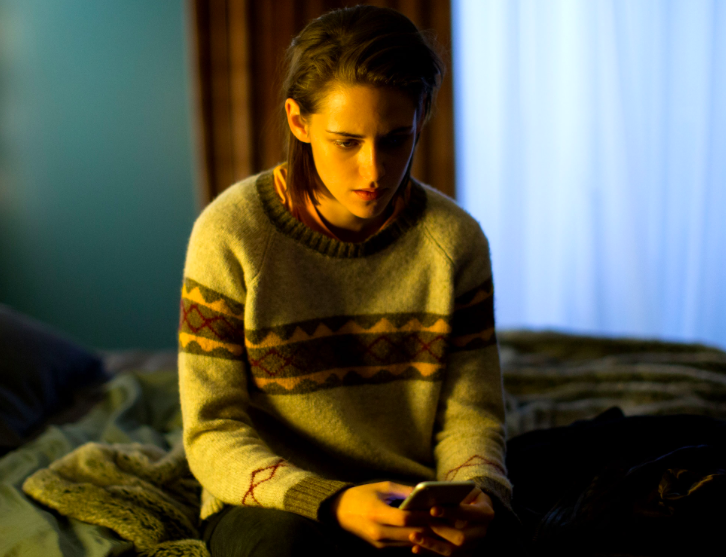Olivier Assayas has been creeping into the hearts and psyches of American viewers since Carlos, a five and a half hour miniseries released in 2010 detailing Venezuelan revolutionary Carlos the Jackal’s slew of rebel attacks that began in 1973 and ended with his arrest in 1994. Or maybe it was the segment he directed for 2006’s basic bitch filmic anthem for Paris, Paris Je T’aime, that initially reeled in a more mainstream audience.
Whenever Assayas began to gain global traction is perhaps arbitrary, but there can be no denying he upped his international ante with 2014’s Clouds of Sils Maria, for which Kristen Stewart won a César Award (her gamine aesthetic is undeniably irresistible to the French). Using the Woody Allen with Scarlett Johansson approach, Assayas invariably knew a good muse when he saw one and, accordingly, wrote his latest, Personal Shopper, specifically with Stewart in mind. Set against the backdrop of Assayas’ native Paris–fittingly for the premise, the world’s fashion capital–Stewart plays the role of Maureen Cartwright (a deliberately unglamorous name), medium/personal shopper–the former title of which she’s far more passionate about. And yet, picking out the couture of Kyra (Nora von Waldstätten), presumably some sort of model/actress (though it’s never clearly established), is how she must pay her bills. As is the case with Clouds of Sils Maria, Stewart once again plays a part that speaks heavily to class division–granted, Personal Shopper is more concerned with how all of us are constantly being haunted, as well as how technology can and usually does augment paranoia.
Though Maureen has a boyfriend named Gary (Ty Olwin) waiting for her in Oman while he works on a project, Maureen herself is waiting, too. For her dead twin brother, Lewis, to give her some sort of sign that he’s “crossed over” (he was also a medium). The cause of his somewhat abrupt death as a result of a heart “malformation” that both twins were born with (giving Stewart viable reason to take her top off for a checkup in the movie–in case Mr. Skin didn’t know) leaves Maureen feeling that her own demise could be just as unpredictably imminent. This, of course, only adds to her attunement to the dead.
Her decision to remain in Paris–where Lewis’ essence lingers–and wait it out as she tries to detect his presence most every night at Lara’s (Sigrid Bouazis), Lewis’ now “widowed” girlfriend, has some visibly damaging effects on her psyche. For starters, her limited communication with the living, persistent coffee intake (it’s even more potent in Europe, you know) and cigarette smoking add to Maureen’s generally fraught nature. Most of all, however, is being constantly chained to her phone, awaiting the next potential source of dread from Kyra’s demands (e.g. deciding to keep two pairs of leather pants Maureen promised to return to the couturier).
While it’s not novel in life, Assayas’ idea to use this everyday source of anxiety as the basis for a psychological thriller is nothing short of brilliant in its execution. After all, it’s far more engaging to watch Maureen sweat it out over the agony of watching those three iMessage dots from “Unknown” instill anticipation than enduring it ourselves. Her constant attachment to her phone comes off as both natural and unnatural–Assayas being one of the few directors willing to call such attention to our dependency on technology in “high cinema.” If she isn’t texting an undead spirit, then she’s typically watching videos on the train detailing the life of Hilma af Klint. Or finding inspiration in a melodrama about Victor Hugo communing with the dead.
Like the ghosts she comes into contact with, the technology-centric life she leads is incorporeal, a foil for the telephonic phantoms around her in that one constantly has to call into question what is real. Even her interactions with Gary over Skype serve to accent this point–it’s a relationship sustained over a screen, tinting their dynamic with more than a touch of the synthetic.
What’s not synthetic, though, is the spirit who is texting Maureen, and its ability to draw out her innermost secrets, chiefly, that she has “no desire if it’s not forbidden.” Most forbidden, to her, is trying on the expensive clothes she chooses for Kyra. After all, she’s the one who lovingly and carefully selects them, and yet, is never permitted the final reward of being able to wear them. With the ghost’s goading encouragement, Maureen gives in to a whole new side of herself. And it is in these moments of self-surrender that the final lines of the movie, “Lewis is that you? Lewis is that you? Or is it just me?”, heighten the effect of never really being capable of grasping at the tangible in the twenty-first century.





















